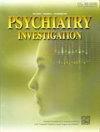Association Between Hypnotics and Dementia: A Mini Narrative Review
IF 1.8
4区 医学
Q3 PSYCHIATRY
引用次数: 0
Abstract
Objective This narrative review aims to provide a comprehensive assessment of the existing literature on the relationship between hypnotics and dementia, considering both potential link and inconclusive or lack of association.Methods Data from studies that investigate the association between hypnotic medications and dementia were reviewed. Studies included both cohort studies and systematic reviews, participants with various type of dementia and hypnotics including benzodiazepines (BZDs) and Z-drugs (ZDs).Results The existing literatures presents conflicting evidence regarding the association between hypnotics, including BZDs and ZDs, and the risk of dementia. Some studies suggest a potential link between prolonged use of hypnotics and an increased risk of dementia. However, other studies indicate inconclusive or lacking evidence regarding this association. Factors such as study design, sample characteristics, and control of confounding variables contribute to the variability in findings.Conclusion The relationship between hypnotics and dementia remains complex and controversial. While some studies suggest a potential association, others find inconclusive or conflicting evidence. Future research should focus on addressing methodological limitations, considering classifying dementia subtypes, and try to adjust medication lag time.催眠药与痴呆症的关系:微型叙事回顾
目的 本叙述性综述旨在对催眠药与痴呆症之间关系的现有文献进行全面评估,既考虑潜在联系,也考虑不确定或缺乏联系。研究包括队列研究和系统综述,参与者患有不同类型的痴呆症,使用的催眠药包括苯二氮卓类药物(BZDs)和Z类药物(ZDs)。结果 关于催眠药(包括BZDs和ZDs)与痴呆症风险之间的关系,现有文献提供了相互矛盾的证据。一些研究表明,长期使用催眠药与痴呆症风险增加之间存在潜在联系。然而,其他研究则表明这种关联并不确定或缺乏证据。研究设计、样本特征和混杂变量控制等因素导致了研究结果的差异。一些研究表明两者之间存在潜在联系,而另一些研究则发现了不确定或相互矛盾的证据。未来的研究应重点解决方法学上的局限性,考虑对痴呆症亚型进行分类,并尝试调整用药滞后时间。
本文章由计算机程序翻译,如有差异,请以英文原文为准。
求助全文
约1分钟内获得全文
求助全文
来源期刊

Psychiatry Investigation
PSYCHIATRY-
CiteScore
4.10
自引率
3.70%
发文量
105
审稿时长
6-12 weeks
期刊介绍:
The Psychiatry Investigation is published on the 25th day of every month in English by the Korean Neuropsychiatric Association (KNPA). The Journal covers the whole range of psychiatry and neuroscience. Both basic and clinical contributions are encouraged from all disciplines and research areas relevant to the pathophysiology and management of neuropsychiatric disorders and symptoms, as well as researches related to cross cultural psychiatry and ethnic issues in psychiatry. The Journal publishes editorials, review articles, original articles, brief reports, viewpoints and correspondences. All research articles are peer reviewed. Contributions are accepted for publication on the condition that their substance has not been published or submitted for publication elsewhere. Authors submitting papers to the Journal (serially or otherwise) with a common theme or using data derived from the same sample (or a subset thereof) must send details of all relevant previous publications and simultaneous submissions. The Journal is not responsible for statements made by contributors. Material in the Journal does not necessarily reflect the views of the Editor or of the KNPA. Manuscripts accepted for publication are copy-edited to improve readability and to ensure conformity with house style.
 求助内容:
求助内容: 应助结果提醒方式:
应助结果提醒方式:


